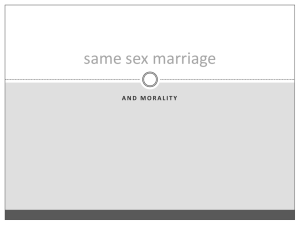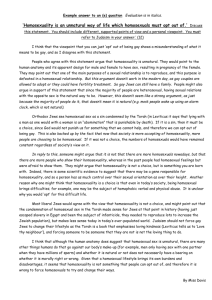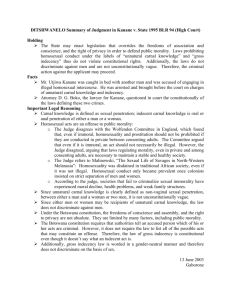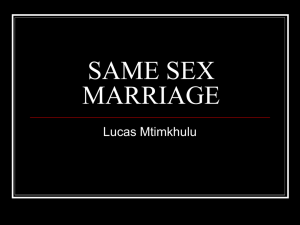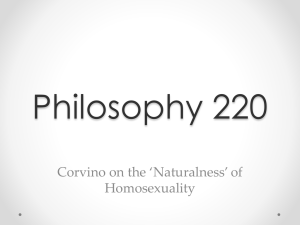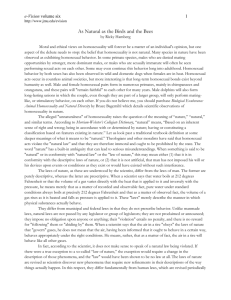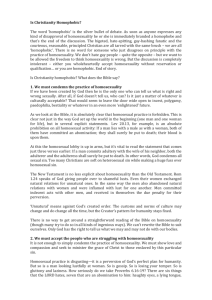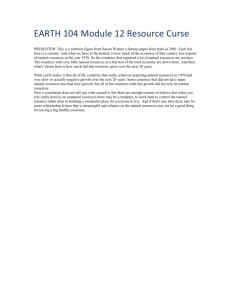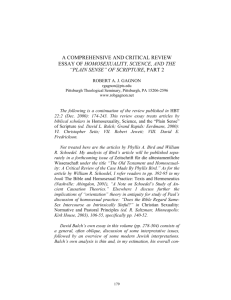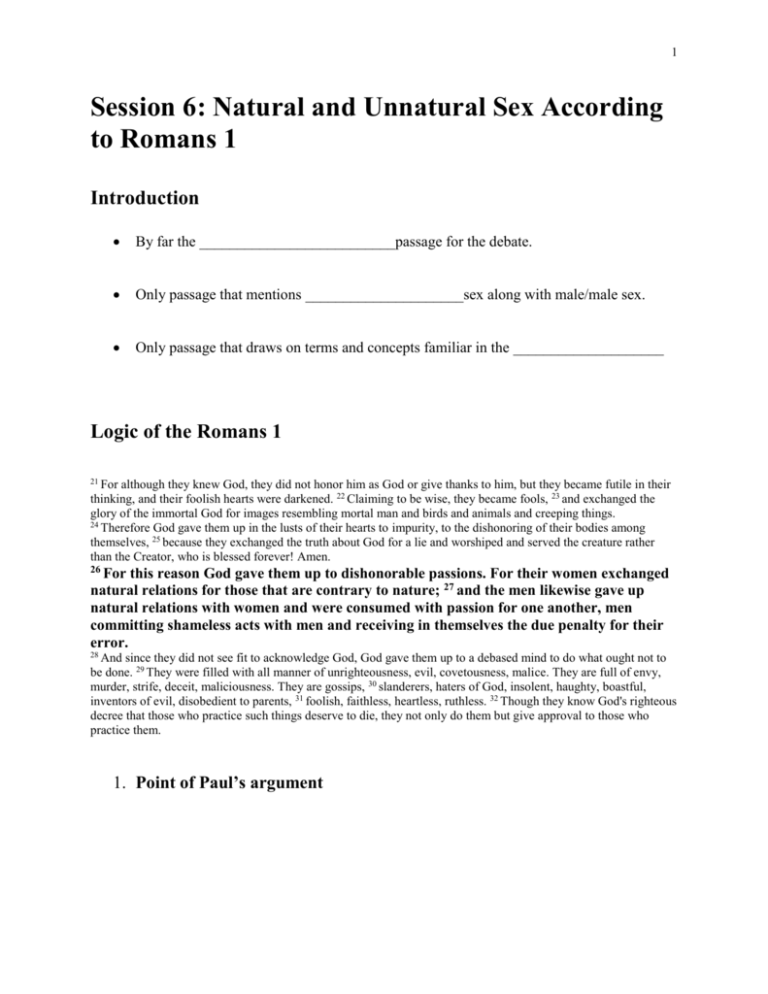
1
Session 6: Natural and Unnatural Sex According
to Romans 1
Introduction
By far the __________________________passage for the debate.
Only passage that mentions _____________________sex along with male/male sex.
Only passage that draws on terms and concepts familiar in the ____________________
Logic of the Romans 1
21
For although they knew God, they did not honor him as God or give thanks to him, but they became futile in their
thinking, and their foolish hearts were darkened. 22 Claiming to be wise, they became fools, 23 and exchanged the
glory of the immortal God for images resembling mortal man and birds and animals and creeping things.
24
Therefore God gave them up in the lusts of their hearts to impurity, to the dishonoring of their bodies among
themselves, 25 because they exchanged the truth about God for a lie and worshiped and served the creature rather
than the Creator, who is blessed forever! Amen.
26 For
this reason God gave them up to dishonorable passions. For their women exchanged
natural relations for those that are contrary to nature; 27 and the men likewise gave up
natural relations with women and were consumed with passion for one another, men
committing shameless acts with men and receiving in themselves the due penalty for their
error.
28
And since they did not see fit to acknowledge God, God gave them up to a debased mind to do what ought not to
be done. 29 They were filled with all manner of unrighteousness, evil, covetousness, malice. They are full of envy,
murder, strife, deceit, maliciousness. They are gossips, 30 slanderers, haters of God, insolent, haughty, boastful,
inventors of evil, disobedient to parents, 31 foolish, faithless, heartless, ruthless. 32 Though they know God's righteous
decree that those who practice such things deserve to die, they not only do them but give approval to those who
practice them.
1. Point of Paul’s argument
2
2. Logic of 1:26-27
o Creation not properly relating to the “other.”
o Not talking about specific people; it’s a general sweep of humankind, not a
commentary on specific people.
“Paul is speaking in corporate terms of the sweep of history, not the
experience of each and every individual practitioner of same-sex
intercourse” (Gagnon, 389).
3. Creation
o Paul is referring back to creation. Allusions to Gen 1-2 include:
“ever since the creation of the world” (1:20)
“the Creator” (1:25)
use of female and male rather than women and men (see Gen 1:27).
Rom 1:23 clearly echoes Gen 1:26
3
Meaning of “Unnatural”
1. The Debate
a. Traditionalists
b. Revisionists
i. Nature =
ii. Boswell
iii. Helminiak
1. Paul doesn’t mean “according to the universal laws of nature” but
to act “unexpectedly” or “in an unusual way” (What the Bible
Really Says about Homosexuality, p. 79).
iv. Vines
1. “How we understand this passage hinges in large part on how we
understand the meaning of the terms ‘natural’ and ‘unnatural’. It’s
commonly assumed by those who hold to the traditional
interpretation that these terms refer back to Genesis 1 and 2, and
are intended to define heterosexuality as God’s natural design and
homosexuality as an unnatural distortion of that design.”
2. “…the term “nature” here refers to social custom, not to the
biological order, and it is a culturally specific term.”
c. Summary:
2. Greek and Stoic use
4
a. Plato’s Laws “use the expression ‘contrary to nature’ in the same form that it
appears in Romans 1:26 to describe same-sex eros (cf. Laws 636c, 841d)”
b. Dio Chrysostom, Discourse, 7.135, 151-152 critiques homosexuality, seemingly
pederasty, as going against “sufficient limit that set by nature” (physis).
c. Plutarch describes homosexual sex as “contrary to nature with males” (arenas)
and the love between men and women as “natural” (te physei). The passive
partner is described as acting “contrary to nature” (para physin) (Dialogue on
Love, 751C, E).
d. Musonius Rufus. “Those who do not live luxuriously or who are not worthless
must conclude that the only justified sexual practices are those that are
consummated within marriage for the purpose of creating children, since these
practices are licit (nomima) as well; and that those sexual practices which aim at
mere pleasure are unjust and illicit, even if they take place within marriage.
Among other types of intercourse, those that involve moikheia ([i.e. with freeborn
women under another man’s control] are the most illicit; in no way more
moderate than these is intercourse of males with males, since this bold act is
contrary to nature (para physin). As for those types of intercourse with females
apart from moikheia that cannot occur licitly (kata nomon): all of these are
shameful as well, because they occur as a result of lack of self-control” (On
Sexual Intercourse, 63.17-64.12).
3. Jewish use
a. Josephus: “…what are our laws about marriage? That law owns no other mixture
of sexes but that which nature has appointed, of a man with his wife, and that
this be used only for the procreation of children. But it abhors the mixture of a
male with a male; and if any one do that, death is its punishment” (Ap. 2.199,
alluding to Lev 20:13).
b. Josephus talks about the intercourse between males as “unnatural” (para physin)
and says that the homosexual intercourse among males in Greek mythology is
“unnatural” (para physin) (Ap. 2.273, 275)
c. Philo labels pederasty as “an unnatural pleasure” (ten para physin hedonen)
(Spec. Leg. 3.37-42; cf. Abr.i 133-141, where the Sodomites threw off the laws of
nature).
4. Richard Hays:
“I have cited these texts at some length because they demonstrate that in Paul's
time the categorization of homosexual practices as para physin was a
commonplace feature of polemical attacks against such behavior, particularly in
5
the world of Hellenistic Judaism. When this idea turns up in Romans 1 (in a form
relatively restrained by comparison to some of the above examples), we must
recognize that Paul is hardly making an original contribution to theological
thought on the subject; he speaks out of a Hellenistic-Jewish cultural context in
which homosexuality is regarded as an abomination, and he assumes that his
readers will share his negative judgment of it. In fact, the whole design and logic
of his argument demands such an assumption. Though he offers no explicit
reflection on the concept of "nature," it is clear that in this passage Paul identifies
"nature" with the created order. The understanding of "nature" in this
conventional language does not rest on empirical observation of what actually
exists; instead, it appeals to an intuitive conception of what ought to be, of the
world as designed by God. Those who indulge in sexual practices para physin are
defying the creator and demonstrating their own alienation from him.” (Hays,
“Relations Ntural and Unnatural,” 194).
5. “Unnatural” (para physin) doesn’t always mean “against the Creator’s
moral will.”
6. Summary
1.
2.
6
Counter Arguments
1. We need to move beyond Paul
a. “I have argued that Paul’s condemnation of homoeroticism, particularly female
homoeroticism, reflects and helps to maintain a gender asymmetry based on
female subordination. I hope that churches today, being appraised of the
history that I have presented, will no longer teach Rom 1:26f as
authoritative” (Brooten, Love Between Women, 302).
2. Rhetorical Trap
3. Heterosexuals having homosexual sex (not homosexuals having
homosexual sex).
7
4. Exploitative forms of homosexual activity
5. “Moral Logic” assumes a low view of women
Conclusion
1. Paul echoes a typical Greco-Roman and Jewish critique against homosexual acts.
2. Paul does not seem to have a specific form of homosexual activity in view, nor does he
assume that only procreative forms of sex are valid or that women should be passive and
therefore only have sex with men, who should be active.
3. The moral logic: God’s creative design is that men and women should only have sexual
relations with an “other”—another human of a different gender. (In the same way,
humans should only worship an “other”—the Creator God, not creation.

